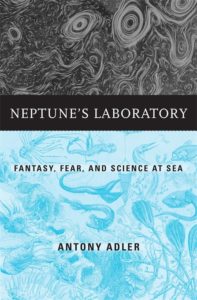Antony Adler, Neptune’s Laboratory: Fantasy, Fear, and Science at Sea. Cambridge, MA: Harvard University Press, 2019. 256 pages. $39.95USD.
By Nicholas Allen

The terrace doors of Monaco’s Musée Océanographique open to the warm light of the sun over the Mediterranean, an aspect as grand as the dreams of its founder, Prince Albert, who saw in the ocean sciences an opportunity to find at sea what was proves so elusive on land: harmony, justice, enlightenment. Antony Adler’s book, Neptune’s Laboratory: Fantasy, Fear and Science at Sea, is a brilliant catalogue of the power that water has as a medium of imagined liberty for cultures anchored to the dead weights of war and the nation state. Insightful, clear-headed and often surprising, Neptune’s Laboratory is a model book in the history of marine sciences, all the more admirable for its brevity and concision. At once an overview of the literature and history of the sea as a domain of scientific study, and a recovery of the archives that linger from two centuries and more of undersea fever dreams, Neptune’s Laboratory does the essential work of expanding the account of coastal and maritime exploration beyond the Anglophone domain.
In doing so Adler complicates, and diversifies, the sea as a mutable site of human concern, which leads the book to some wonderful revelations, not least the passage in which he describes the Fantasia Pacifica Pageant that was held to celebrate the opening of the Oakland Bay and Golden Gate Bridges in San Francisco in 1939. This takes place in a longer sequence that details the opulent fantasy of the Pacific Ocean as a new site for westward expansion in attendance to the Golden Gate International Exposition, at the center of which was a Pacific theme park whose diverse colors and forms were ‘possessed’, as one contemporary put it, ‘of an almost ineffable serenity’. It is typical of the book that these moments of placid optimism are followed historically by periods of overwhelming brutality; all of Albert of Monaco’s hopes for scientific internationalism were overwhelmed by World War One, just as the wider Pacific was already a site of colonial suffering in 1939, and soon to be worse. It is typical too that Adler finds another way to tell the story; among the throngs at the pageant was his grandmother, fresh from Minneapolis and ready for the excitements of the west coast. Her aunt noticed her enthusiasm, chiding her gently for the thought of her mother seeing her, ‘clad in the seventh and last veil’, a mid-west Salomé in ‘a string of pearls, and a tin bra, staggering home at 4 a.m.!’
Adler manages the scale of his subject with equal mastery throughout Neptune’s Laboratory, which often opens moments of freedom that are as much beside the sea as in it. One of the twentieth-century’s leading scholars of the ocean and its governance was Elisabeth Mann Borgese, the daughter of the Nobel Laureate, Thomas Mann. If he appears as a chauvinist disinterested in his daughter’s potential he did share one moment of revelation with her that speaks to the relentless spirit of inquiry that marks so many of Adler’s maritime moments. As a child by the sea Borgese asked her father ‘What is after the horizon?’ ‘The horizon’, he answered, ‘and after, … again the horizon’. This is a perspective that Mann might have shared with Samuel Beckett, and an outlook that resonates with the attitude of open-minded expansiveness that so many of the experiments in Neptune’s Laboratory represent. That these explorations also attend aggression between nation states for knowledge and resources is one of the book’s grimmer conclusions, and representing these intertwined narratives is a real achievement. Neptune’s Laboratory is a fascinating and original guide to the underwater, both real and imagined, and will be a waypoint, like Helen Rozwadowski’s Vast Expanses, in the charting of ocean histories for years to come.
Nicholas Allen is Baldwin Professor of Humanities at the University of Georgia.







